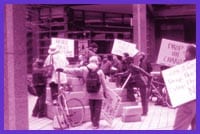The head of 52 Division and a collection of lawyers have made a side-deal to allow the Totally Naked Toronto Men Enjoying Nudity to continue with their monthly naked afternoon dances.
“This deal is on an interim basis,” says TNT MEN lawyer, Peter Simm. “The deal is that the police will treat the TNT dances at the Barn as private parties and hence will not enter the premises during those events, provided that admissions are not sold at the door, but have to be purchased elsewhere, which can be on the day of the event, as long it’s not at the Barn itself.
“That is the arrangement and we’re very pleased with it, being the result of responsible cooperation between all parties involved, so as to reach an arrangement that minimizes inconvenience to the public until the of interpretation ‘disorderly conduct’ has been dealt with… by the courts.”
Two 52 Division officers visited the Barn in February and warned they’d get tough if a TNT MEN dance went ahead. Sure enough, they came by again during the Mar 25 shindig and filed a charge of “permitting disorderly conduct” under the Liquor Act.
The men’s group has held monthly hoe-downs at the Barn for more than three years without incident. And Simm doesn’t believe a naked man standing next to a liquor licence posted on a wall constitutes “disorderly conduct.”
About 30 people protested the charge at an Apr 16 demo that began in front of the Church St bar (one block south of Carlton) and ended at police headquarters, a few blocks away on College.
“This pattern of police harassment is going on and on,” said speaker Lee Zaslofsky. “It’s leading to self-censorship in the community. All this comes at the same time that police chief Julian Fantino has launched a love-in with the gay community – or certain segments of it. A lot of people are getting very confused messages – probably intentionally.”
Supt Aidan Maher, of 52 Division, said in an interview before the deal had been worked out that he knows a lot about homos. He says he started out policing “the track” (frequented by hustlers) and gay bars 37 years ago, when he first started walking a beat for the Toronto force.
He patrolled Queen’s Park, Philosopher’s Walk at the University Of Toronto, and did licence checks on gay bars. He denies ever having harassed gay people, and doesn’t recall specific busts.
And he says no one’s being harassed now.
The Bijou sex bar was repeatedly raided by police, starting Jun 13, 1999, until the owner shut it down (twice) because of what he considers harassment. Charges against more than a dozen patrons were eventually dropped in a hail of publicity. With the Bijou dumping its liquor licence earlier this year, police no longer have an easy in.
The Black Eagle leather bar, says Maher, was also warned, but “they did comply” and no charges were laid.
“Only two bars have been charged in 18 months [with gay indecency-related charges],” Maher says. “All I’m suggesting is we maintain consistency over 3,000 establishments [in 52 Division]. Harassment can’t be supported by the facts.”
“They [homosexuals] want to be treated equally, the same as anybody else, they also want to be able to do things that are contrary to the licence. What we’re doing is treating your bars the same as everybody else.”
Some argue that that equal treatment does not lead to equal outcomes. And greater fear of police by minorities – such as within the gay community also in 52 Division’s bailiwick – may be the result.
“I’m not responsible for their culture,” says Maher. “All we can do as a police service is show that we care.
“You have to live in the same community as straight people.”

 Why you can trust Xtra
Why you can trust Xtra


